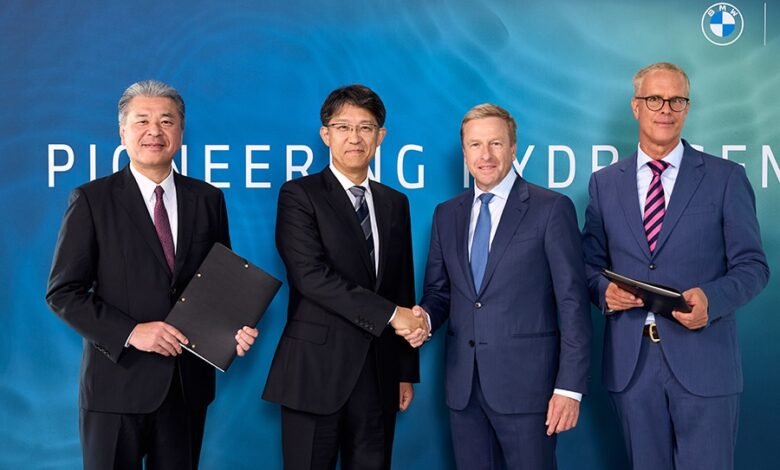Toyota and BMW strengthen collaboration towards the advancement of a hydrogen sector

Toyota Motor Corporation (Toyota) and the BMW Group (BMW) signed an agreement to strengthen collaboration in the hydrogen sector, to create a hydrogen society and achieve overall carbon neutrality. Both companies will work together on the development of fuel cell systems and the improvement of infrastructure.
The two companies signed an agreement in 2011 to establish a mid-long-term cooperative relationship in environmental technology, and have jointly advanced the development of environmental technologies, including fuel cells and sports cars, for over a decade. Sharing a common vision of “realizing a hydrogen society,” the two companies will continue to accelerate technological innovation in fuel cell systems.
Toyota and BMW are collaborating on the development of a third-generation fuel cell system, which will be installed in both companies’ models to provide customers with a broader range of fuel cell electric vehicles (FCEV). As a first step, BMW plans to launch its first mass-produced FCEV in 2028.
Both companies will also work to create synergies through collaboration in development and procurement as well as drive down costs by amalgamating powertrain units to expand commercial and passenger vehicle demand. By making FCEV a more accessible option, the partnership will contribute to the creation of a hydrogen society.
Both companies believe that working with like-minded partners is essential for realizing a hydrogen society. Given the need to create clusters of demand for hydrogen in the early stages of popularisation, Toyota and BMW will encourage sustainable hydrogen supply by creating demand and working closely with hydrogen-producing companies as well as distribution and refueling facilities to ensure a stable hydrogen supply and reduce costs.
Koji Sato said, “We are pleased that the collaboration between BMW and Toyota has entered a new stage. In our long history of partnership, we have confirmed that BMW and Toyota share the same passion for cars and belief in “technology openness” and a “multi-pathway” approach to carbon neutrality. Based on these shared values, we will deepen our collaboration in efforts such as the joint development of next-generation fuel cell systems and the expansion of infrastructure, aiming for the realization of a hydrogen society. We will accelerate our efforts together with BMW and partners across various industries to realize a future where hydrogen energy supports society.”
Oliver Zipse commented, “This is a milestone in automotive history: the first-ever series production fuel cell vehicle to be offered by a global premium manufacturer. Powered by hydrogen and driven by the spirit of our cooperation, it will underscore how technological progress is shaping future mobility. And it will herald an era of significant demand for fuel cell electric vehicles.”
Toyota has positioned hydrogen as a key energy source in its efforts to achieve carbon neutrality and has been advancing initiatives in collaboration with many partners across the areas of “producing, transporting, storing, and using” hydrogen.
Toyota aims to be best-in-town by conducting locally rooted management that caters to each region’s market characteristics and customer needs. Moving forward, we will continue to address the needs of customers in each region by focusing on a multi-pathway approach that includes FCEV, BEV, HEV, and PHEV options, all while steadily working towards reducing CO2 emissions.